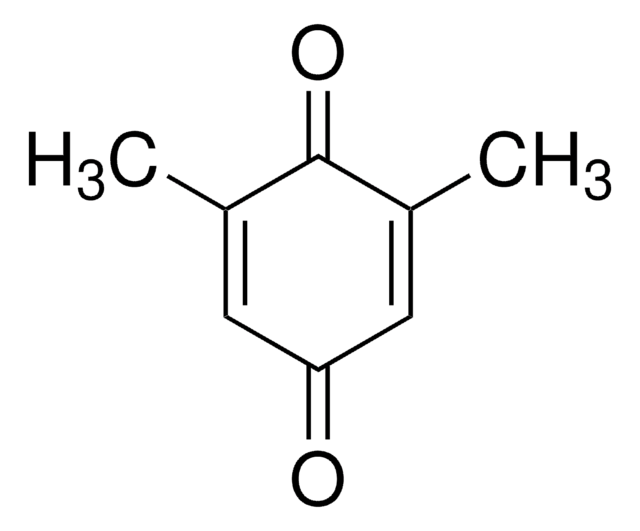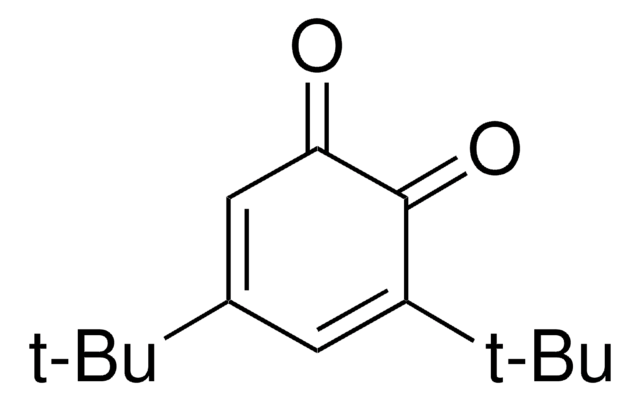All Photos(2)
About This Item
Linear Formula:
[(CH3)3C]2C6H2(=O)2
CAS Number:
Molecular Weight:
220.31
EC Number:
MDL number:
UNSPSC Code:
12352100
PubChem Substance ID:
NACRES:
NA.22
Recommended Products
Assay
99%
mp
152-154 °C (lit.)
functional group
ketone
SMILES string
CC(C)(C)C1=CC(=O)C(=CC1=O)C(C)(C)C
InChI
1S/C14H20O2/c1-13(2,3)9-7-12(16)10(8-11(9)15)14(4,5)6/h7-8H,1-6H3
InChI key
ZZYASVWWDLJXIM-UHFFFAOYSA-N
Related Categories
General description
2,5-Di-tert-butyl-1,4-benzoquinone (DTBBQ) is an 2,5-disubstituted quinone. It is an antibacterial compound. It has been isolated from marine Streptomyces sp. VITVSK1. Pressure dependance on the intramolecular and intermolecular migration rates of Na+ and K+ in a 2,5-di-tert-butyl-1,4-benzoquinone ion pair have been evaluated by using a high-pressure EPR technique.
Signal Word
Warning
Hazard Statements
Precautionary Statements
Hazard Classifications
Eye Irrit. 2 - Skin Irrit. 2 - STOT SE 3
Target Organs
Respiratory system
Storage Class Code
11 - Combustible Solids
WGK
WGK 3
Flash Point(F)
Not applicable
Flash Point(C)
Not applicable
Personal Protective Equipment
dust mask type N95 (US), Eyeshields, Gloves
Choose from one of the most recent versions:
Already Own This Product?
Find documentation for the products that you have recently purchased in the Document Library.
Customers Also Viewed
P Adams et al.
The Biochemical journal, 335 ( Pt 1), 131-138 (1998-09-22)
Mutational analysis of trans-membrane helices M3, M4, M5 and M7 of the Ca2+-ATPase revealed a novel phenotypic variant, M4 [Y295A (the one-letter symbols are used for amino acid residues throughout)], displaying an increased affinity for Pi and decreased affinity for
J K Foskett et al.
The American journal of physiology, 262(3 Pt 1), C656-C663 (1992-03-01)
Previous studies have demonstrated in single rat parotid acinar cells that the microsomal Ca(2+)-ATPase inhibitor thapsigargin mobilizes Ca2+ specifically from the inositol 1,4,5-trisphosphate (IP3)-sensitive Ca2+ store, activates plasma membrane Ca2+ permeability, and induces intracellular Ca2+ concentration ([Ca2+]i) oscillations that are
G Reiser et al.
Experimental cell research, 202(2), 440-449 (1992-10-01)
Continuous superfusion of rat glioma cells with medium containing bradykinin (from 0.2 nM) induced a transient hyperpolarization followed by regular hyperpolarizing oscillations of the membrane potential. Similar repetitive hyperpolarizing oscillations were caused by extracellularly applied bradykinin or muscarine or by
Y K Ju et al.
The Journal of physiology, 525 Pt 3, 695-705 (2000-06-16)
The mechanisms of sarcoplasmic reticulum (SR) Ca2+ release in pacemaker cells from the sinus venosus of the cane toad (Bufo marinus) were studied. Single, isolated cells were voltage clamped using a nystatin-perforated patch. Ionic currents and intracellular Ca2+ concentration ([Ca2+]i)
B Papp et al.
Cell calcium, 14(7), 531-538 (1993-07-01)
In mixed platelet membrane vesicles the presence of two distinct endoplasmic reticulum-type calcium pump enzymes of 100 and 97 kD molecular mass has been demonstrated. We have previously shown that both calcium pumps were recognized by polyclonal anti-sarcoplasmic reticulum calcium
Our team of scientists has experience in all areas of research including Life Science, Material Science, Chemical Synthesis, Chromatography, Analytical and many others.
Contact Technical Service















